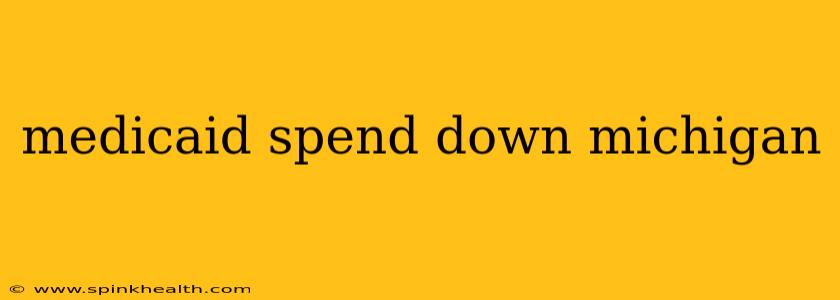The journey to accessing healthcare can be complex, particularly when navigating the intricacies of Medicaid eligibility. In Michigan, as in many states, a significant hurdle for some applicants is the "spend down" requirement. This isn't a simple process, and it often leaves individuals feeling lost and overwhelmed. Let's unravel the complexities of Michigan's Medicaid spend down, offering a clear and empathetic guide to help you understand this crucial aspect of healthcare access.
Imagine this: Sarah, a single mother working part-time, finds herself facing unexpected medical bills. Her income is too high to qualify for Medicaid outright, but too low to afford private insurance or the mounting medical costs. She's caught in a frustrating gap. This is where the "spend down" comes into play.
What is Medicaid Spend Down in Michigan?
Medicaid spend down refers to the process of reducing your countable assets and resources below a specific threshold to qualify for Medicaid coverage in Michigan. Essentially, you must demonstrate to the state that you have spent down your assets until your income and resources are low enough to meet Medicaid's eligibility criteria. It's a temporary measure, a bridge to crucial healthcare coverage.
This isn't about simply giving away your assets; there are specific rules and guidelines that must be meticulously followed. Failing to adhere to these regulations could lead to delays or denial of your Medicaid application.
What Assets and Resources Count Towards the Spend Down?
This is where things get detailed. Many assets are considered in determining your eligibility. These often include:
- Cash: Savings accounts, checking accounts, and readily available funds.
- Investments: Stocks, bonds, and other similar holdings.
- Real Estate: Property ownership (excluding your primary residence, usually with certain limitations).
- Vehicles: The value of your vehicles (exemptions exist for certain vehicles used for work or transportation needs).
- Other Assets: Personal property, jewelry, and other valuable items.
The exact limits and exemptions are constantly updated, so it’s crucial to check the most current guidelines on the Michigan Department of Health and Human Services (MDHHS) website. Don't rely on outdated information; the rules can change.
How Long Does the Medicaid Spend Down Process Take?
The length of the spend-down process varies significantly depending on individual circumstances. Factors influencing the timeline include:
- The amount of assets exceeding the limit: The more you need to spend down, the longer the process will take.
- Complexity of your financial situation: Complicated financial situations require more time for review and verification.
- Responsiveness of the applicant: Promptly providing requested documentation speeds up the process significantly.
- Backlog at MDHHS: Processing times can vary due to workload fluctuations within the department.
It's vital to be patient and proactive throughout this period. Regularly check the status of your application and communicate any changes in your financial situation promptly to MDHHS.
What Happens After the Spend Down is Completed?
Once you have successfully completed the spend-down process and meet all other Medicaid eligibility requirements, you’ll be approved for coverage. You'll receive your Medicaid card, allowing you to access essential healthcare services. Remember, this coverage is often temporary; continued eligibility will depend on your ongoing income and assets. Regular reviews are standard practice.
Can I Get Help Navigating the Medicaid Spend Down Process?
Absolutely! You don't have to navigate this complex system alone. Several resources can assist you:
- The MDHHS website: The official source for all eligibility requirements, guidelines, and application processes.
- Local community organizations: Many organizations offer free assistance with Medicaid applications and spend-down guidance.
- Legal aid services: Legal aid providers can offer support and representation if you face challenges during the process.
The Medicaid spend-down process in Michigan can be challenging, but understanding the rules and seeking assistance when needed can significantly ease the journey. Remember, accessing necessary healthcare is a right, and you have resources to help you achieve it. Don't hesitate to reach out for the support you need.

